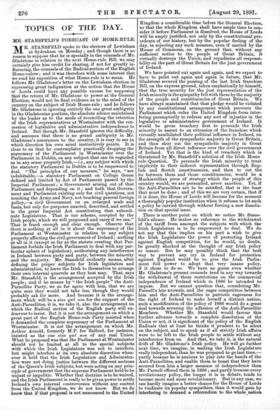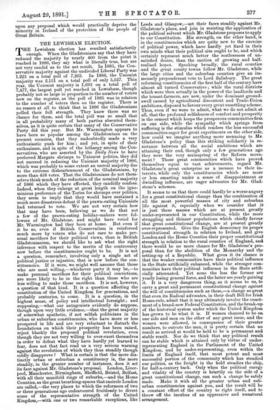TOPICS OF THE DAY.
MR. STANSFELD'S FORECAST OF HOME-RULE.
MR. STANSFELD spoke to the electors of Lewisham at Sydenham on Monday ; and though there is no reason to suppose that he is specially in the counsels of Mr. Gladstone in relation to the next Home-rule Bill, we may certainly give him credit for sharing, if not for greatly in- fluencing, the counsels of the Radical section of the English Home-rulers ; and it was therefore with some interest that we read his exposition of what Home-rule is to mean. He follows Mr. Gladstone's letter on the Lewisham election in expressing great indignation at the notion that the House of Lords could have any possible excuse for supposing that the return of Mr. Gladstone to power at the General Election, would not be final evidence as to the mind of the country on the subject of Irish Home-rule ; and he follows Mr. Gladstone in ignoring entirely the one great ambiguity in the Gladstonian position, the absolute silence maintained by the leader as to the mode of reconciling the retention of the Irish representatives at Westminster with the con- cession of legislative and administrative independence to Ireland. But though Mr. Stansfeld ignores the difficulty, and assumes that there is no grand ambiguity in Mr. Gladstone's assurances to the country, it is easy to see in which direction his own mind instinctively points. It is clear to us that he contemplates practically dropping the supremacy of the Parliament in Westminster over the Parliament in Dublin, on any subject that can be regarded as in any sense properly Irish,—i.e., any subject with which the statutory Parliament in Dublin is to be empowered to deal. " The principles of our measure," he says, "are indubitable,—a statutory Parliament on College Green defined and limited by Act of Parliament passed by the Imperial Parliament ; a Government arising out of that Parliament and depending on it ; and both that Govern- ment and Parliament existing only for civil questions, not touching the Army and Navy, not touching general foreign policy,—a civil Government on an enlarged scale and basis, but only for purposes enacted, described, and settled in the great Imperial Act constituting that subordi- nate Legislature. That is our scheme, accepted by the Irish people, which we will propound and carry if we can." That is frank enough and clear enough. Observe that there is nothing at all in it about the supremacy of the Parliament at Westminster in relation to any subject properly affecting the civil government of Ireland; nothing at all in it (except so far as the statute creating that Par- liament forbids the Irish Parliament to deal with any par- ticular sphere of legislation), authorising any interference in Ireland between party and party, between the minority and the majority. Mr. Stansfeld evidently means, after defining the proper subjects for Irish legislation and administration, to leave the Irish to themselves to arrange their own internal quarrels as they best may. That, says Mr. Stansfeld, is the arrangement accepted by the Irish people ; and if he means by " the Irish people ' the Anti- Parnellite Party, we so far agree with him, that we are quite sure they would not take less, though they would probably ask for more. And because it is the arrange- ment which will be a sine qud non for the support of the Anti-Parnellites, it is, we take it, also the arrangement on which the Radical section of the English party will en- deavour to insist. But it is not the arrangement on which a great part of the English Home-rule Party insisted when it demanded the complete supremacy of the Parliament at Westminster. It is not the arrangement on which Mr. Arthur Arnold, formerly M.P. for Salford, for instance, insisted as the one sine qud non of any real Union. What he proposed was that the Parliament at Westminster should not be limited at all to the special subjects with which the Irish Legislature was not to interfere, but might interfere at its own absolute discretion when- ever it held that the Irish Legislature and Administra- tion were not doing justice between the different sections of the Queen's Irish subjects, but were acting on any prin- ciple of government that the supreme Parliament held to be unjust or impolitic. Whether that doctrine is to be waived, and the Irish Parliament is really to be given power to settle Ireland's own internal controversies without any control from the United Kingdom, we do not know. But we do know that if that proposal is not announced to the United Kingdom a considerable time before the General Election, so that the whole Kingdom shall have ample time to con- sider it before Parliament is dissolved, the House of Lords will be amply justified, not only by the constitutional pre- cedents of our history, but by the popular feeling of the- day, in rejecting any such measure, even if carried by the- House of Commons, on the ground that, without any sufficient notice to the people of Great Britain, itr virtually destroys the Union, and repudiates all responsi- bility on the part of Great Britain for the just government of Ireland.
We have pointed out again and again, and we expect to' have to point out again and again in future, that Mr.
Gladstone secured the passing of the last Irish franchise- Bill, on the express ground, taken emphatically by himself, that the true security for the just representation of the Irish minority is the sympathy felt with them by the majority of the people and constituencies of Great Britain. We have always maintained that that pledge would be violated by any constitutional arrangement which prevents the Parliament which rules the United Kingdom from inter- fering peremptorily to redress any sort of injustice in the legislative or administrative government of Ireland. It would be gross treachery first to persuade the Irish minority to assent to an extension of the franchise which virtually annihilated their political influence in Ireland, on the strength of the sympathetic majority in Great Britain, and then shut out the sympathetic majority in Great Britain from all direct influence over the civil government of Ireland. Yet that is the kind of treachery which is threatened by Mr. Stansfeld's solution of the Irish Home rule Question. To persuade the Irish minority to trust implicitly to their indirect representation through Eng- lish and Scotch constituencies, and then to cut the tie between them and those constituencies, would be a Machiavellian piece of strategy which the people of this country would, we are persuaded, never sanction. Yet, if the Anti-Parnellites are to be satisfied, that is the least that must be done ; and of this we are very certain, that if it is done, the House of Lords will become for the moment a thoroughly popular institution when it refuses to let such a policy be carried through without forcing a new dissolu- tion on that special issue.
There is another point on which we notice Mr. Stans- feld's silence. He makes no reference to the withdrawal of the tariff from amongst the subjects with which the Irish Legislature is to be empowered to deal. We do not say that this implies on his part a wish to give the Irish Legislature the power of protecting Ireland against English competition, for he would, no doubt, be greatly shocked at the thought of any Irish policy so insane. But he may possibly think that the best way to prevent any cry in Ireland for protection against England would be to give the Irish Parlia- ment full power to adopt that very insane policy, if it chose to do so. We have no guess even whether Mr. Gladstone's present counsels tend in any way towards the withdrawal of those restrictions on the commercial independence of Ireland which in 1886 he intended to impose. But we cannot question that., considering Mr. Parnell's late avowals, and the eager competition between him and the Anti-Parnellites in patriotic eagerness for the right of Ireland to make herself a distinct nation, such a modification of the policy of 1886 would do a great deal towards securing the adhesion of the Anti-Parnellite Members. Whether Mr. Stansfeld would favour this further advance towards a complete dissolution of the Union or not, it is significant of the policy of the English Radicals that at least he thinks it prudent to be silent on the subject, and to speak as if all strictly Irish affairs were to be left to the Irish people to settle without any interference from us. And that, we take it, is the natural drift of Mr. Gladstone's Irish policy. He will go further next time, we imagine, in making the Irish Legislature really independent, than he was prepared to go last time,— partly because he is anxious to play into the hands of the Anti-Parnellites, and enable them to boast that they have secured from him a larger measure of independence than Mr. Parnell offered them in 1886 ; and partly because every revolutionary policy, the longer it is in debate, tends to become more and more revolutionary. But in any case, we can hardly imagine a better chance for the House of Lords to vindicate its popular sympathies, than it would gain by interfering to demand a referendum to the whole_nation. upon any proposal which would practically deprive the minority in Ireland of the protection of the people of Great Britain.



































 Previous page
Previous page